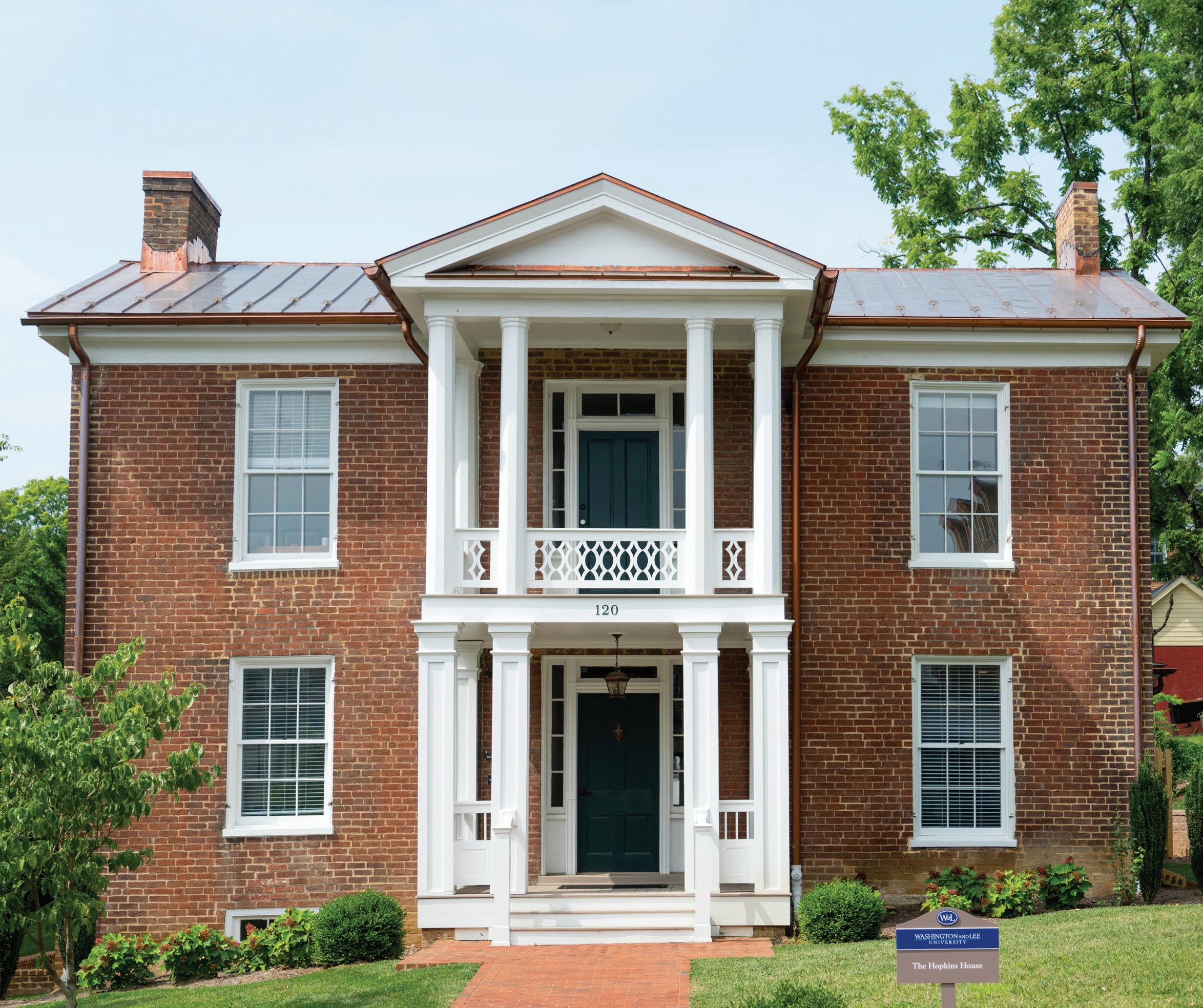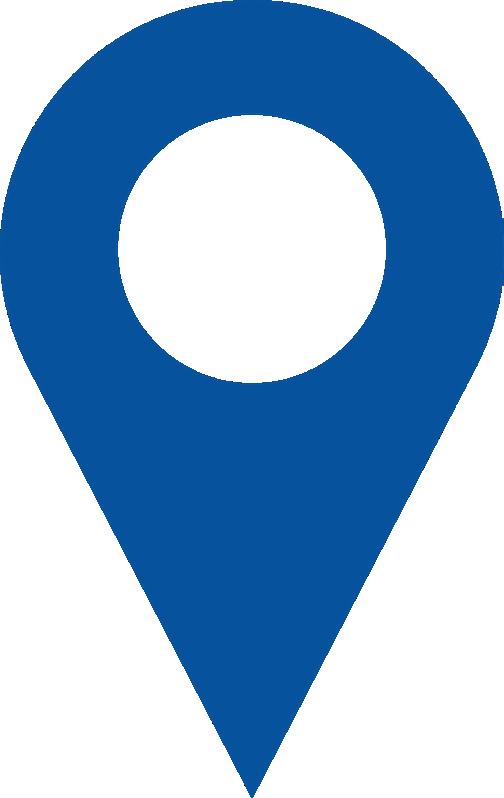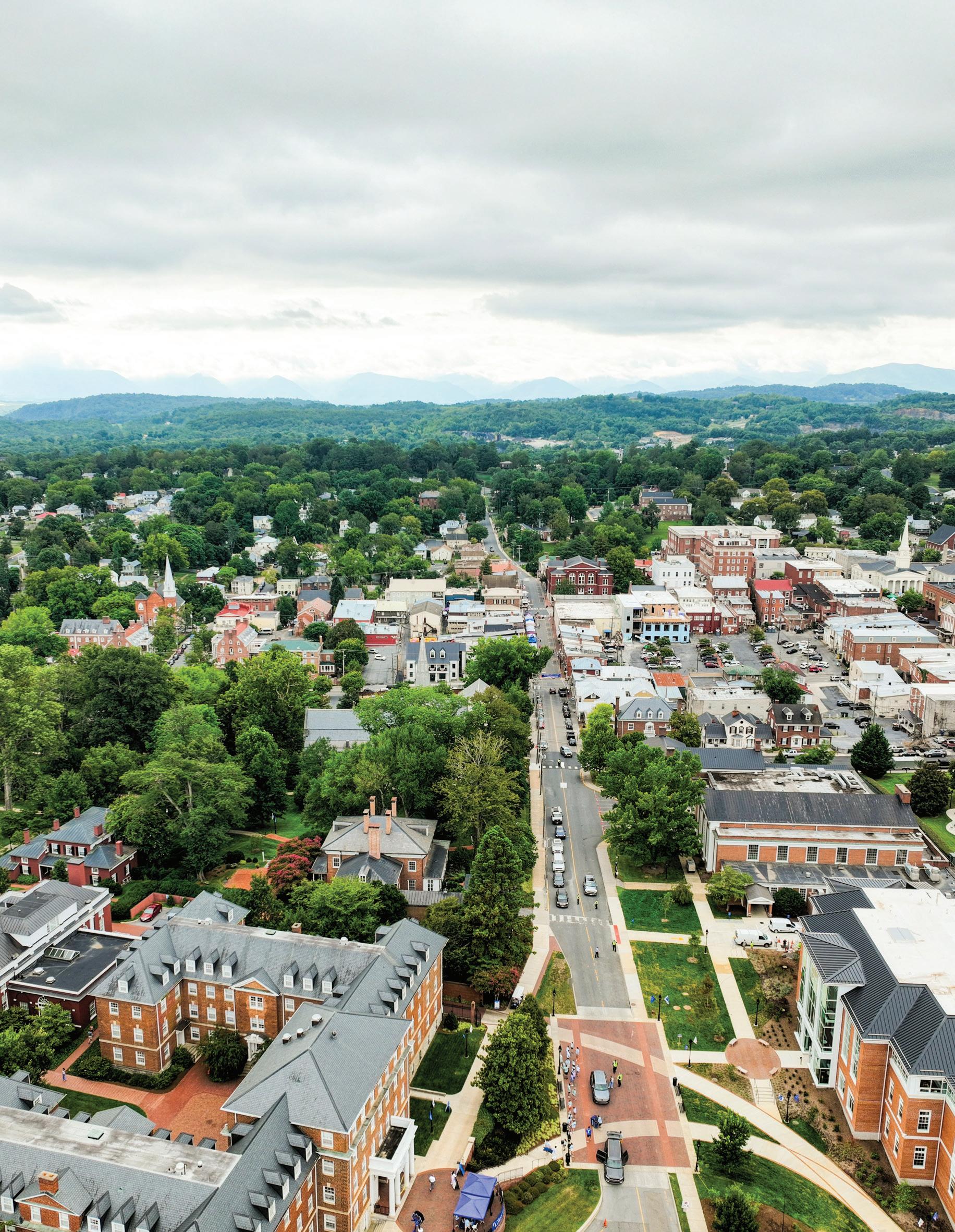






When I became Director of Community-Based Learning in 2020, our office, like many at the University, was navigating COVID-19. As we moved toward a new normal, we rebuilt our network of community partners, faculty, and students. Now, five years later, we’ve strengthened and broadened these connections.
Our achievements include having over 60 faculty members across 20 disciplines offering courses designated as CBL. We also expanded our summer internship program, placing interns at local nonprofits to foster positive change. Additionally, we launched phase one of an AmeriCorps VISTA initiative with Campus Compact, aimed at supporting more low-income and first-generation students in service learning.
This year, we added seven local organizations as official W&L community partners: Lewis Gale, Rockbridge Area Conservation Council, Western Virginia Regional Jail, Augusta Health, Adventure Addicts Racing, Rockbridge Recovery, and the Amica Center for Immigrant Rights bringing our community partner total up to 78. I look forward to the innovative and impactful projects that will result from these collaborations.
Lastly, I am particularly proud of our CBL team for sharing their knowledge on best practices through conferences and publications. Here’s to another academic year filled with meaningful connections and impactful collaborations!
Sascha Goluboff
This past spring, students enrolled in Indigenous Ethnography and Foodways, a CBL-designated environmental studies course, and collaborated with NDPonics, an indigenousfounded and led nonprofit. NDPonics stewards the Kihkospé:hla Living Lab in partnership with the Landberry Foundation. Kihkospé:hla (“kee-kohn-shpay-la”) is located on six acres of ancestral Yesàh territory in Rockbridge County, and offers a learning space at the nexus of both western and Indigenous styles of teaching. Guided by Professor Catarina Passidomo, the course invited students to explore the relationship between Indigenous peoples and their foodways through a place-based lens, connecting academic learning to the landscapes, knowledge systems, and lived experiences of Indigenous communities.
“Partnering with NDPonics allowed us to ground our readings of Monacan history and culture in a physical site — Kihkospé:hla — and for students to understand the power of land rematriation within a context of settler-colonialism,” said Passidomo. “I think students (and I) came to see Kihkospé: hla—the land, water, trees, and other plants and animals that make up that place—as our real community partners, with NDPonics as their steward—a living, breathing demonstration of reciprocity, a core concept in the course.”
Students visited the headquarters of the Monacan Nation in Amherst County and talked to someone who had attended the mission school originally established in the 1800s. Throughout the term, students also engaged in reflective reading, collaborative projects, and immersive site visits
when students are invited to engage not just intellectually, but relationally and ethically, their contributions become more meaningful. “
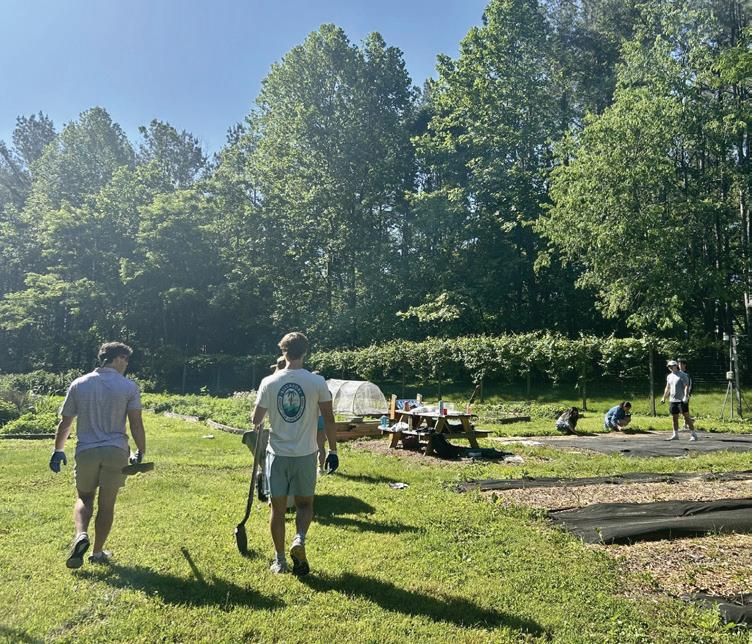

to Kihkospé:hla. The site itself, which includes a stream, trails, and a classroom, serves as a space where ecology, cultural history, and governance intersect. As Alexa Sutton, a Board member of NDPonics, explained, “Our core mission is to cultivate a transformative learning space where land is treated as a living relative with its own rights, and where Yesáh cultural memory is intentionally centered.” Early in the course, Sutton offered a guest lecture that reframed students’ understanding of Kihkospé:hla “not simply as an artifact of geography, but a manifestation of kinship, survivance [survival + resistance], and lived experience.”
Sutton’s role of framing also happened behind the scenes, before the course even started. “We encouraged [Passidomo] to connect first with community leaders like Vicky Ferguson, who has long carried and protected Yesàh memory in the Shenandoah Valley. That step allowed her to engage locally and relationally before entering into deeper cultural spaces. That step was essential: before anyone could teach about our foodways, they needed to learn about our history, our migrations, and the people still carrying that knowledge today.”
For their final project, students worked in small groups to create educational posters with a multimedia component. Poster topics, which were determined by the groups in consultation with NDPonics, centered on key themes from the course. Students showcased these posters at W&L’s Spring Spotlight event. Later, they will be displayed during Indigenous History Month programming at W&L before being donated to Kihkospé:hla.
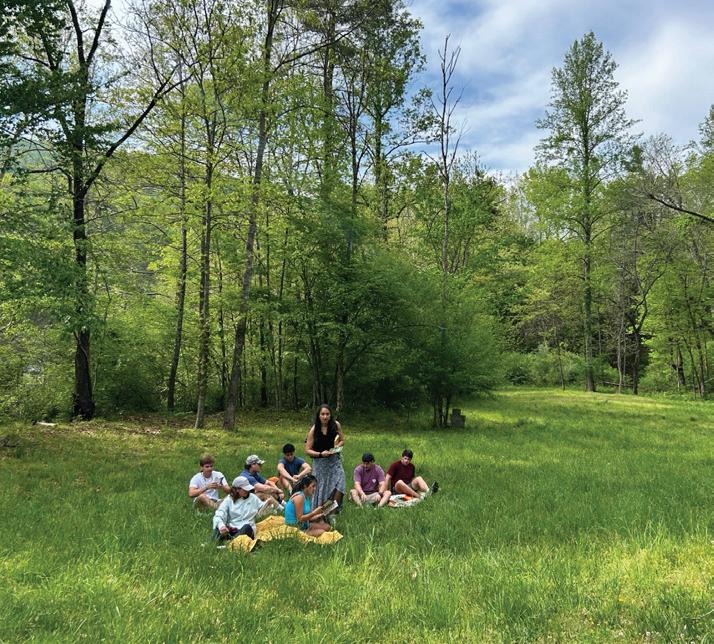
One student reflected, “Over the course of one week, I have undergone a total reframing in terms of how I see the world around me, and how I interpret the history of Indigenous peoples.” This paradigm shift came about not only from the intellectual exercise that the course required of students, but more importantly, from the way it invited students to think relationally, highlighting the importance of humility, respect, reciprocity, and a willingness to listen, key concepts in Yesàh educational values and central to communitybased learning. As Passidomo put it, “A core skill I hope to nurture in students is empathy. We don’t often think of empathy as a skill, or as something a course or curriculum should endeavor to develop. But I see empathy as foundational to all the other hard skills students learn in college.”
For NDPonics, the partnership with Washington and Lee embodies its broad vision for the lab. “Kihkospé:hla represents a living example of resistance to erasure and exploitation.” said Sutton. “Through projects in native species restoration, foodways revitalization, and cross-disciplinary education, we blend traditional Indigenous knowledge with research inquiry to indigenize the learning experience.”
This collaboration affirms the power of reciprocal place and community-based education. As Sutton highlighted, “when students are invited to engage not just intellectually, but relationally and ethically, their contributions become more meaningful—not just for the community, but for their own growth as future scholars, caretakers, and neighbors.” ■

Since Fall 2022, we have offered the Collaborative for faculty interested in forging connections between their classroom and the community. As part of a cohort of equally enthusiastic CBL-curious individuals, faculty engage in conversations with each other and community partners to determine which community-centered initiatives best align with their pedagogical interests and goals. Once faculty have selected a course for which they wish to develop a Community-Based Learning (CBL) experience, whether as a single assignment or multiple assignments, we proceed to discuss the essential components. These components encompass the following: facilitating students’ connections between the community initiative and course content through reflection, devising assignments that emphasize mutual reciprocity among faculty, students, and community members, and constructing effective rubrics to assess student progress. Through this process, faculty members examine their assumptions and expectations regarding community engagement. By the conclusion of the Winter term, faculty members possess all the necessary resources to effectively instruct a CBL-designated course.
Over the past three years, our office has been privileged to work with nineteen individuals from a wide range of departments and offices: Business Administration, Cognitive and Behavioral Sciences, the Connolly Center for Entrepreneurship, Earth and Environmental Geoscience, Education Studies, English, Environmental Studies, History, the Houston H. Harte Center for Teaching and Learning, Journalism and Mass Communications, Philosophy, Physics and Engineering, Romance Languages, Sociology and Anthropology, and the University Library. ■
The following is a list of some of the CBL-designated classes (along with their community partners) that have been developed and offered as a result of the Collaborative:
• Business 376: Design Thinking (Virginia Innovation Accelerator)
• Cognitive and Behavioral Science 212: Health Psychology (Rockbridge Area Community Services Board)
• Earth and Environmental Geoscience 101: Dynamic Earth: Introductory Geology (US Forest Service)
• Education 200: Foundations of Education (Lylburn Downing Middle School)
• Environmental Studies 295I: Indigenous Ethnogeography and Foodways (Kihkospé:hla Living Lab and NDPonics)
• Spanish 398E: Spanish-American Seminar: Amazonian and Andean Indigenous Knowledge Today: A Cultural and Environmental Approach (Boxerwood Nature Center and Woodland Gardens)
Did you know that study-abroad classes can obtain CBL Designation? Courses partnering with community organizations in their destination countries are eligible if the projects are mutually beneficial for students and community members. Recent examples include:
• Business 390c/Economics 288: Sustainable Development and Social Entrepreneurship: Cuba in the 21st Century
• Education 235: Educating for Global Citizenship: Policies, Practices, and Purposes in the US and Italy
• Film/Sociology and Anthropology 273: Creating Field Documentary on Human Rights in Ghana
This is the first year that the CBL office has offered the Community-Engaged Faculty Award. This award recognizes a faculty member or instructor for exemplary engaged scholarship that fosters reciprocal community partnerships, including teaching community-based learning courses, conducting community-based research, or other initiatives aimed at enhancing the public good. The winner of this award was selected by a committee of faculty and community partners, including Elizabeth Oliver (Associate Dean of the Williams School and the Lewis Whitaker Adams Professor of Accounting), Dayo Abah (Professor of Journalism), Shadrey Sands (Neighborhood Grocery Manager at Rockbridge Area Relief Association), and Jeremy Franklin (Executive Director of Main Street Lexington).
The winner of the 2024-2025 Community Engaged Faculty Award is Dr. Jayne Reino, Visiting Assistant Professor of Spanish, ESOL Faculty Co-Advisor, and CBL Liaison. Prof. Reino received her BS from Boston University and her PhD in Hispanic Literatures and Cultures from the University of Massachusetts Amherst. She has taught in the Romance Languages department at W&L since 2019.
Prof. Reino embodies the best in community engagement. She has offered numerous CBL courses, positively impacted the community through her work in ESOL (English for Speakers of Other Languages), which was founded and
Prof. Reino embodies the best in community engagement
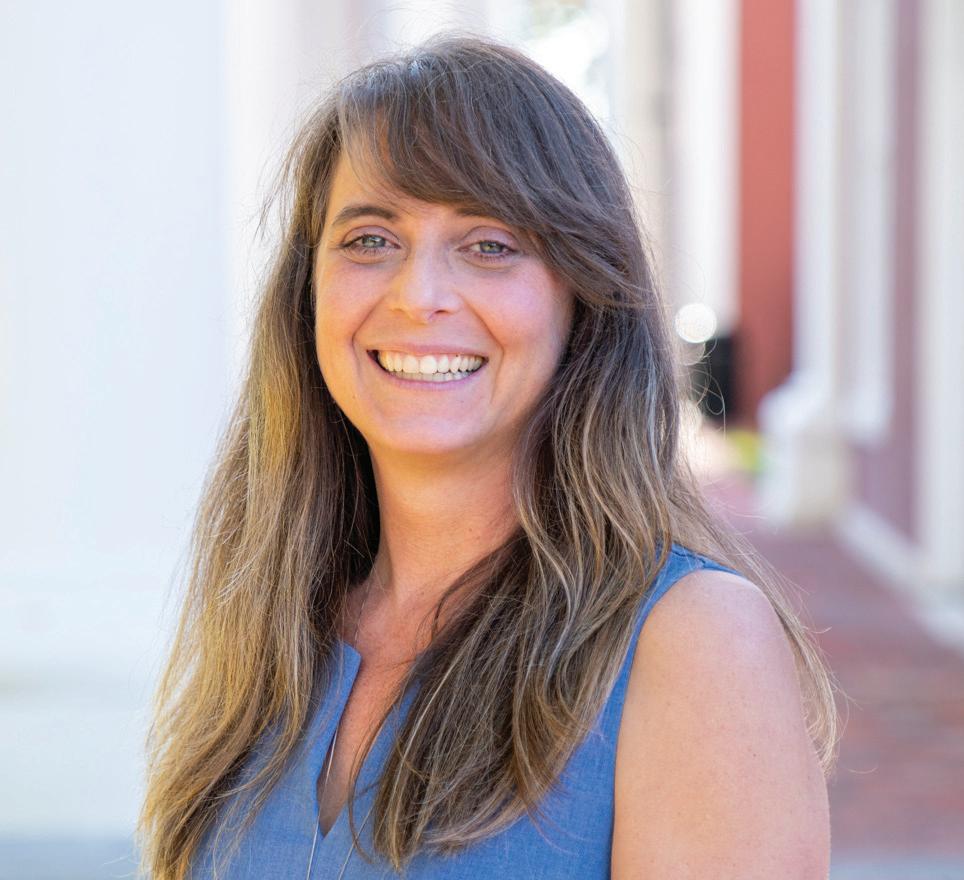
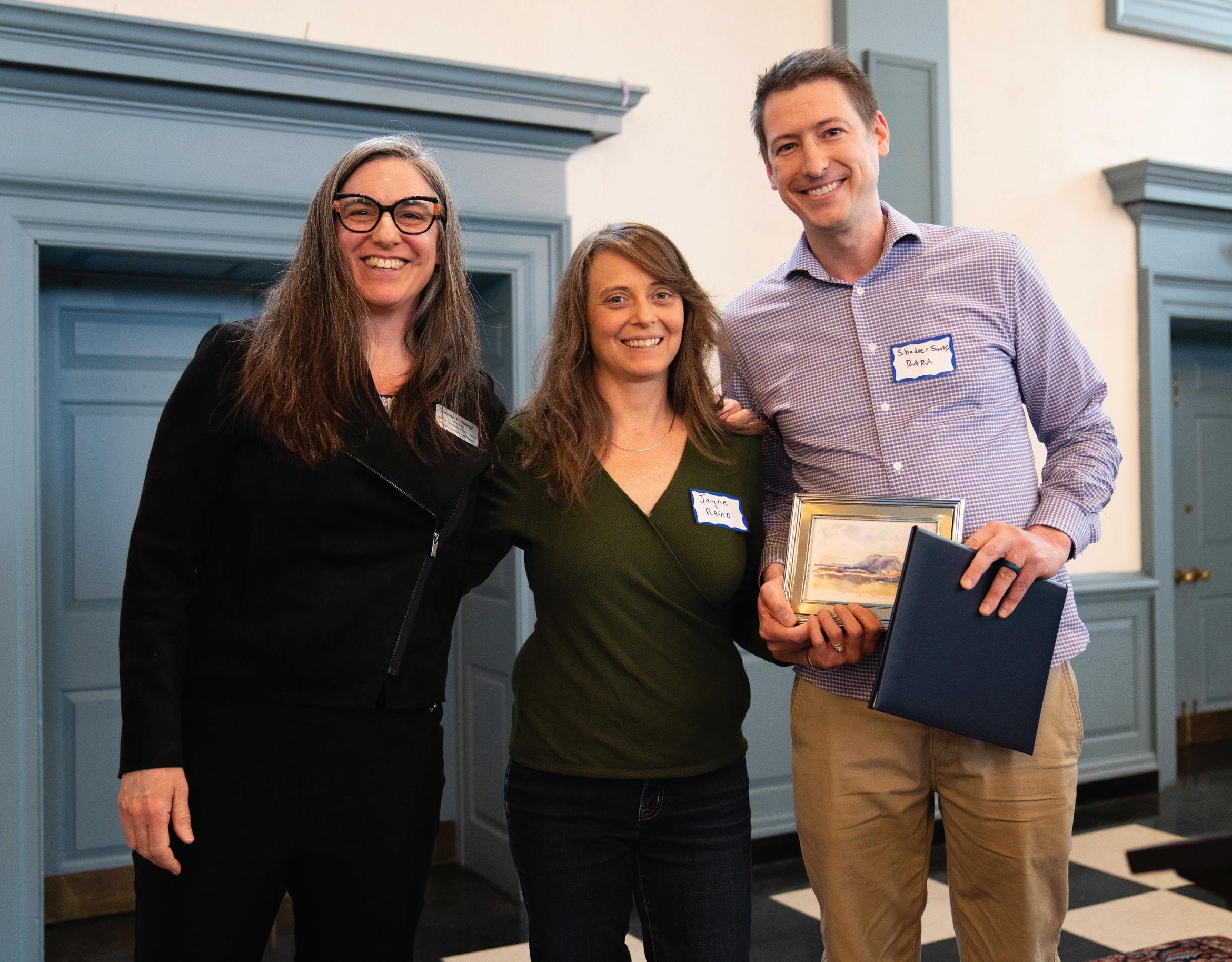
developed by Prof. Ellen Mayock, and co-wrote and published articles on best practices in community-university relationships inside and outside the classroom.
The selection committee was impressed with the breadth of nonprofits with which Prof. Reino has partnered for her CBL courses. Some of those partners include the United Way of Rockbridge, Lexington, and Buena Vista, RARA, Blue Ridge Legal Services, Community Table, CASA, Boxerwood, and Valley Program for Aging Services. The committee praised the follow-through and final products of these course collaborations.
The committee was also impressed by how Prof. Reino supported community building through her co-leadership of ESOL, a student organization
associated with the Department of Romance Languages, the Program of Latin American and Caribbean Studies, and the Office of CommunityBased Learning. W&L students in ESOL offer English classes, in-and-after-school tutoring, community connections, translations, and interpretations, and they have partnered heavily with Project Horizon and other local organizations to help individuals access services. In 2022 and 2023, Prof. Reino directed Programma Sol — accessible summer programming for Spanish-speaking families that helps children continue practicing their literacy skills in English over the summer months.
Project Horizon noted that the support of Prof. Reino and her ESOL students has “been instrumental in strengthening our capacity to serve the household, providing both immediate assistance and long-term educational empowerment.” ■
Scholar-in-Residence is a one-year opportunity that supports a tenure-track or non-tenure track faculty member interested in or is currently conducting research that would enhance knowledge, understanding, and/or create an impact in the Shenandoah Valley area. Prof. Connell Cunningham, Jr. served as CBL’s inaugural Scholar-in-Residence this year. He focused on the chemistry of local wines, identifying and quantifying sugars through gas chromatography-mass spectrometry to develop the taste profiles of specific wine samples, and shared that information with local businesses to promote knowledge and positively impact the local economy.
Prof. Cunningham and a student research team used samples from local vineyards and wine purveyors to develop a chemical method for quantitative analysis. Their testing sought to broaden analysis to tannins, flavonoids, and acids. In exchange for samples, Cunningham’s team provided these businesses with recommendations for identifying, marketing, and influencing the taste profiles of their offerings.
Based on his time as a Scholar-in-Residence, Prof. Cunningham developed a 2026 spring term abroad course called “Bitter Grapes: The Chemistry and Culture of Wine in South Africa.” The class will examine the chemistry of wine, emphasizing chemical composition, fermentation, acidity, phenolics, oxidation, and instrumental analysis. Students will apply analysis techniques in the lab and field-based settings. Students will also be introduced to vineyard operations, the wine business, and regional winemaking with particular attention to South African wines and their historical development. The course will include a community engagement component through the Pebbles Project, promoting experiential learning tied to food insecurity and ethical production. ■
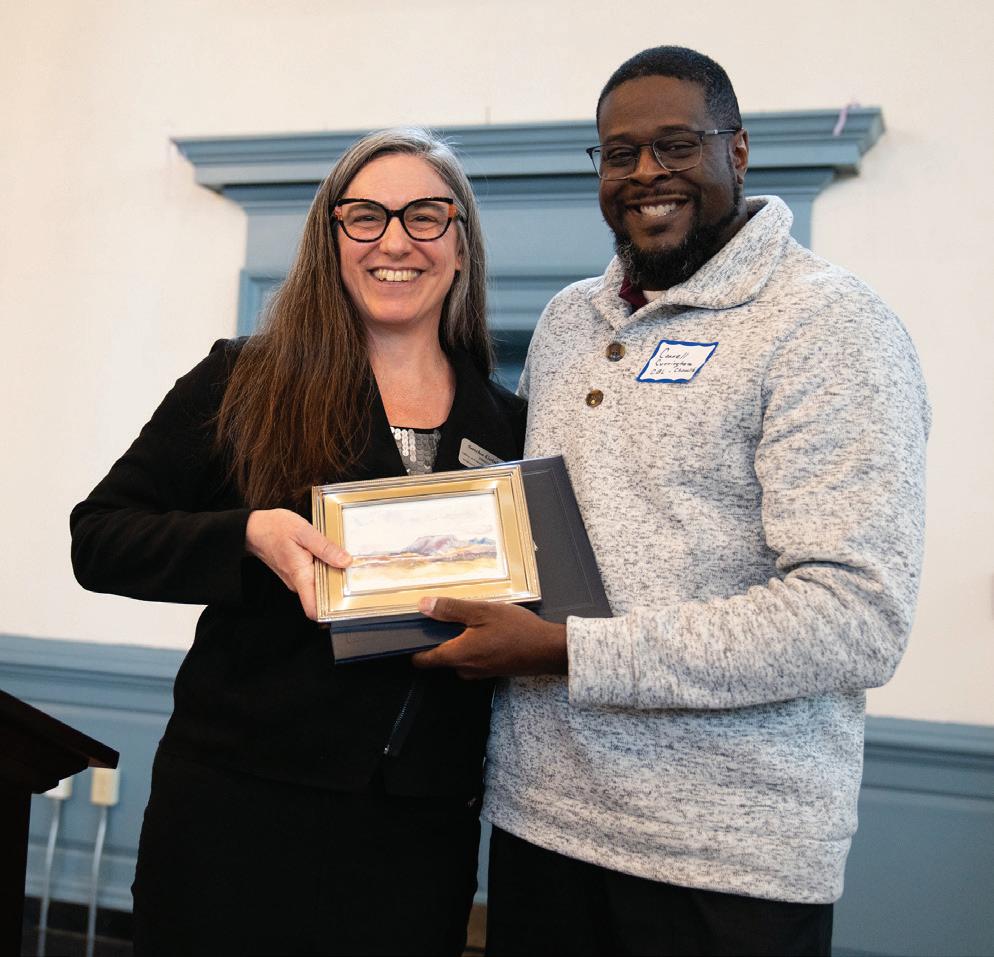
On August 21, more than 45 Residence Life student leaders participated in a day of service facilitated by Community-Based Learning (CBL) in collaboration with Residence Life and the Community Engagement and Service Learning Committee. This inaugural Service Day offered Community Advisors (CAs) and Resident Advisors (RAs) the opportunity to connect with each other while contributing meaningfully to local organizations.
The students volunteered at four community partner sites: Yonderyear Farm, the YMCA Early Learning Center, Campus Kitchen, and the Campus Garden. Their tasks included weeding, picking vegetables, cleaning, organizing, and hands-on work that directly supported the mission of each organization.
Students walked away with a deeper understanding of the community’s needs and the role each organization plays in addressing them. One participant volunteering at Campus Kitchen reflected, “We worked very well together and accomplished a lot in a short period of time, which not only helps the community that Campus Kitchen serves but also helps Campus Kitchen themselves to get set up for a productive year.”
The event also helped foster stronger bonds between student leaders and sparked interest in future partnerships, as another student noted that the day was “a therapeutic experience that allowed us to speak with each other and get to know each other.” Many participants expressed a desire to establish ongoing connections between their residence halls and local nonprofits.
Overall, the service day was a meaningful success, both as a team-building initiative and as a gateway to sustained community engagement. ■
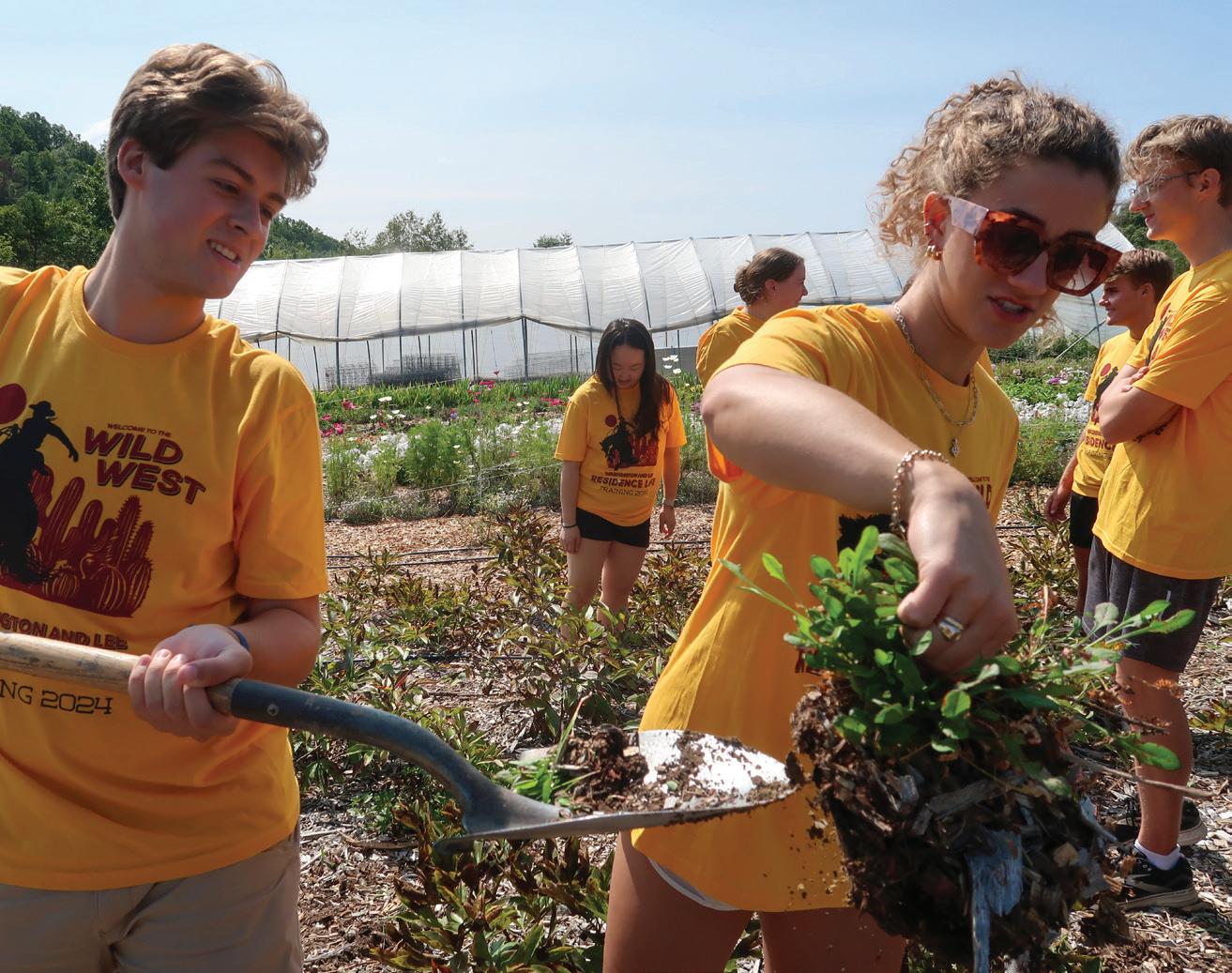
During the 2024-2025
Academic Year, the CommunityBased Learning office has enhanced its outreach and engagement by presenting research and sharing best practices. This compilation of presentations and publications illustrates a multifaceted approach to communityengaged learning, focusing on increasing access, reciprocity, and critical reflection. In their article “(Re)mapping blackness while interrogating whiteness: Enacting a Critical Place-Based Curriculum in Lexington, Virginia, published in Journal of Community Practice, Prof. Sascha Goluboff, Director of CBL, and Prof. Jayne Reino, Visiting Assistant Professor of Spanish, examine how a critical placebased curriculum can reveal local histories of racial injustice, providing a replicable model
for antiracist education grounded in community geography. Bethany Ozorak, Associate Director of CBL, and Prof. Sascha Goluboff investigate the role of peer leadership in enhancing student engagement through a teaching assistant program that supports community-based learning in their article “Piloting a Community-Based Teaching Assistant Program.” published in Journal of the Scholarship of Teaching and Learning Additionally, Alessandra Del Conte Dickovick, Associate Director of CBL, and Bethany Ozorak contributed to best practices by presenting at the Campus Compact 2025 conference on “The Power of Community Learning Agreement,” a structured tool that fosters mutual accountability and communication among students, faculty, and community partners. Alina de Zoysa’s ’25 reflective article “Forging Connections: A Student’s Perspective on the Power of Building
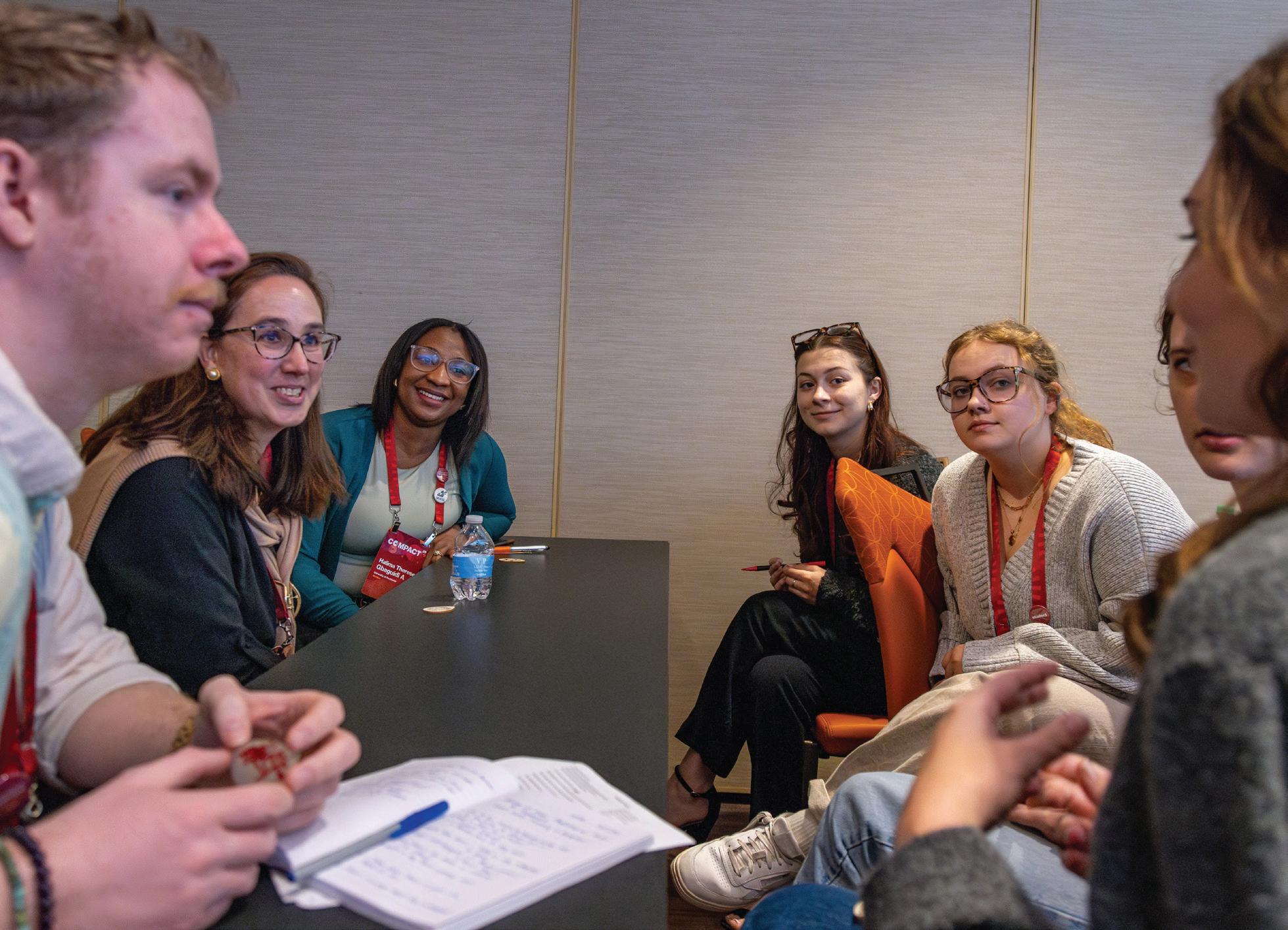
Community”, published in Journal of Community Engagement and Scholarship , highlights her experience learning alongside incarcerated classmates, providing a compelling testimony on the profound impact of shared academic space across differences. Lastly, Cat Hudson, the CBL Office’s AmeriCorps VISTA for the 2425 Academic Year, delivered a presentation titled “Supporting First-Generation and Low-Income College Students Volunteering Off-Campus,” addressing the challenges faced by firstgeneration and low-income students in off-campus volunteering and suggesting strategies for more inclusive community engagement. Collectively, these works represent a dedicated commitment to transformative education through community collaboration, critical inquiry, and inclusive practices. ■
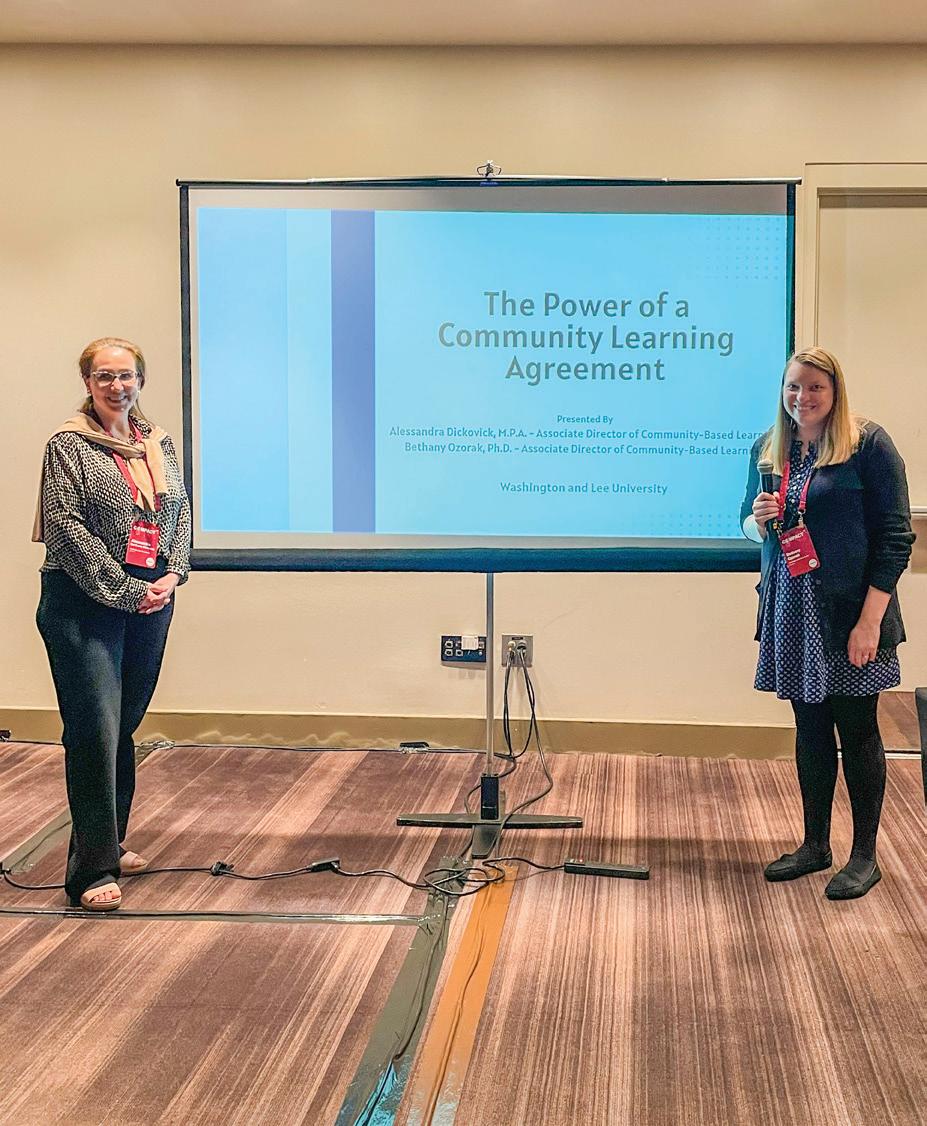
The CBL office is pleased to announce the addition of Natural Bridge State Park as one of W&L’s newest community partners.
Natural Bridge State Park protects one of Virginia’s unique features, the Natural Bridge. This 200-foot-tall limestone arch is all that remains from an ancient cave that has almost totally collapsed. It is a dramatic expression of the power of small things, in this case water eroding limestone over thousands of years. Most of the valley of Virginia is a landscape underlain by limestone, also called karst. The same processes that made the Natural Bridge are ongoing today under our feet.
The Natural Bridge was a revered place to the Monacan Indian Nation, and it has been a draw for tourists around the world since the 1700s. Currently, 200,000 visitors stop by the park each year. The park employs well over two dozen staff from the immediate area.
In Fall 2024, a team of students in Prof. Lloyd Tanlu’s Student Consulting class (Business 197) partnered with Natural Bridge State Park to collect feedback from visitors about how the park could better meet their needs. The park staff hoped that, as a neutral third party, the students would encourage visitors to share their impressions.
The W&L student consulting team developed a survey with input from park staff and then volunteered onsite to administer it. The park provided giveaways for volunteers to hand out to patrons who completed the survey.

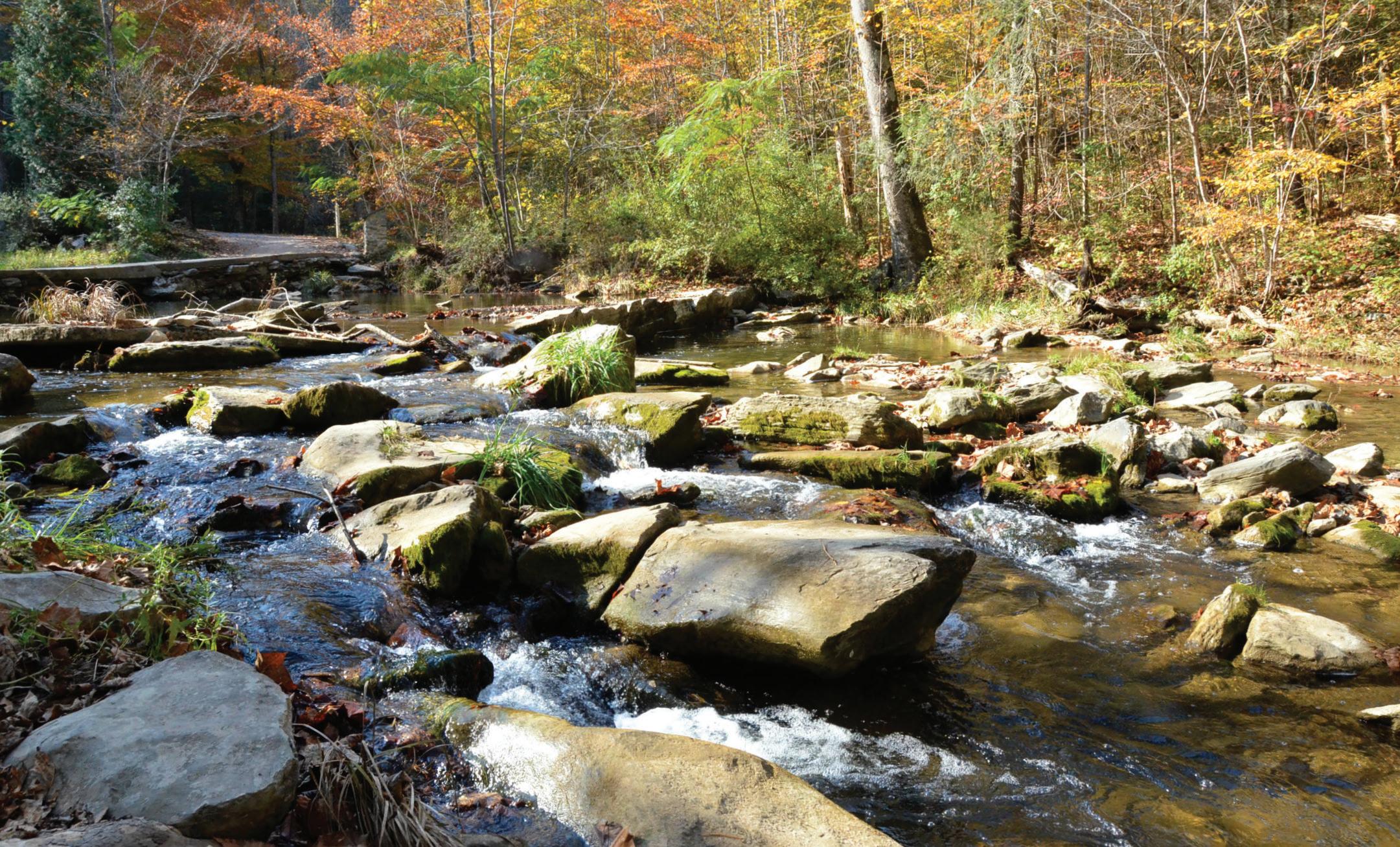
“That helped to increase the response rate, but having excited volunteers was also a big plus,” said Kenneth Horowitz, Chief Ranger of Visitor Experience.
Three common themes emerged from the survey, and the park has already begun addressing them.
First, the 137 stairs are an obstacle for many visitors. The park has accelerated its plans to replace them with a switchback trail to create a gentler ascent back to the parking lot.
Second, directional signage and trail signs could be more prominent. Ranger Horowitz explained that “We applied vinyl stickers to the visitor center doors with open/close times instead of relying on previous signage in letter boards that were easily missed, and we added information about park fees before the stairs, so people are not caught unaware at the bottom and need to go back up 11 flights of steps to get their wallet.”
Third, visitors wanted more amenities, such as water bottle refill stations and additional recycling/trash bins. Ranger Horowitz was pleased to report that the park has placed additional trash cans at strategic points along the trail and increased the number of recycling bins. “As a state park, we encourage visitors to leave no trace and pack their trash out with them – but with the volume of visitation we get, we listened when visitors said they needed an extra hand. Now our rangers find much less dog waste further down the trail. We also have a brand-new water bottle refill station that is seeing plenty of use this summer already.”
Park staff are excited about future collaborations with W&L. “The survey showed that over 60% of our visitors come with their families. [In the future] we could pursue a survey about park programs and times families would attend, or find out how close those groups stay to the park to work with tourism partners on cross-promotion. There are tons of possibilities for getting to know our visitors even further, and W&L Student Consulting can help us do it.” ■
On September 11th, the Community Engagement and Service Learning Advisory Committee, in collaboration with the Office of Community-Based Learning, hosted the 3rd annual Community Engagement Fair on Cannan Green. The event served as a lively and welcoming space for students to explore volunteer and service opportunities with a wide array of local organizations.
This year’s fair brought together representatives from 31 community organizations across the Rockbridge Area. Students had the chance to meet directly with these groups, learn about their missions, and discover ways to get involved through meaningful service.
Beyond the opportunity to engage with community partners, attendees enjoyed a festive atmosphere complete with snacks, cupcakes, a tie-dyeing station, free t-shirts, and a prize raffle. The blend of fun and purpose made the event both informative and enjoyable.
The Community Engagement Fair continues to be a valuable tradition, helping students build connections, contribute to the local community, and discover new ways to make a difference. ■
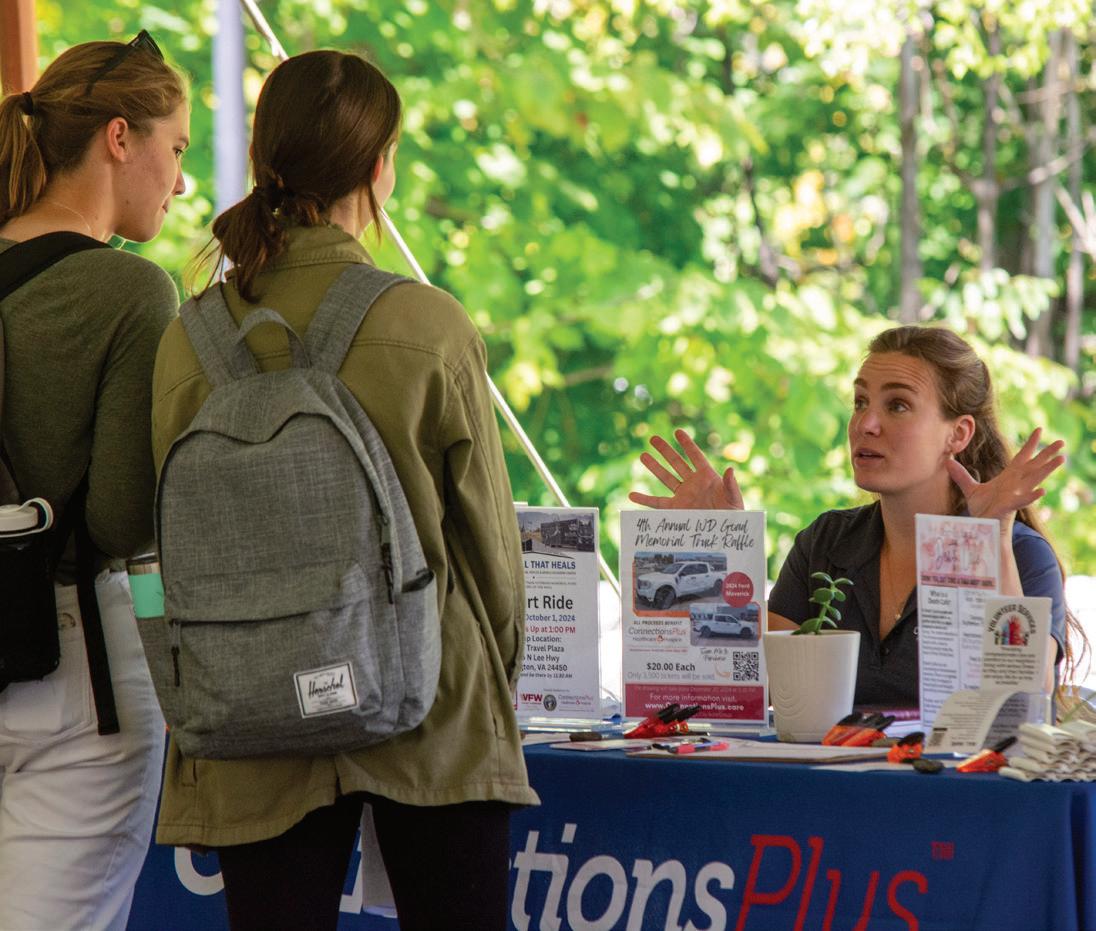
2024-2025
544 49 15 24 students enrolled in CBL courses
Disciplines represented CBL Faculty
CBL-designated courses
7 faculty and instructors are members of the CBL Collaborative that learned CBL best practices and developed their own CBL courses
of Alpha Kappa Alpha Sorority won the W&L Community Service Excellence Award administered through our CBL office
78
total number of official community partners
8
summer internship opportunities in the local community
Campus Compact AmeriCorps VISTA members play a vital role in strengthening the capacity of colleges and universities to support low-income students and local communities. Working behind the scenes, VISTAs develop and expand programs that align with the public mission of higher education—helping individuals and communities rise out of poverty through sustainable partnerships and service initiatives.
Washington and Lee University’s Community-Based Learning (CBL) Office proudly hosted its first Campus Compact AmeriCorps VISTA during the 2024-2025 academic year. Cat Hudson, a recent W&L graduate from the class of 2024, undertook valuable research by surveying and interviewing first-generation and low-income students about their experiences volunteering off-campus. This insightful work revealed two primary obstacles hindering more consistent engagement in service-learning: academic and work responsibilities that limit students’ availability to volunteer, and challenges related to transportation, including vehicle access and the ability to obtain driver’s licenses. ■
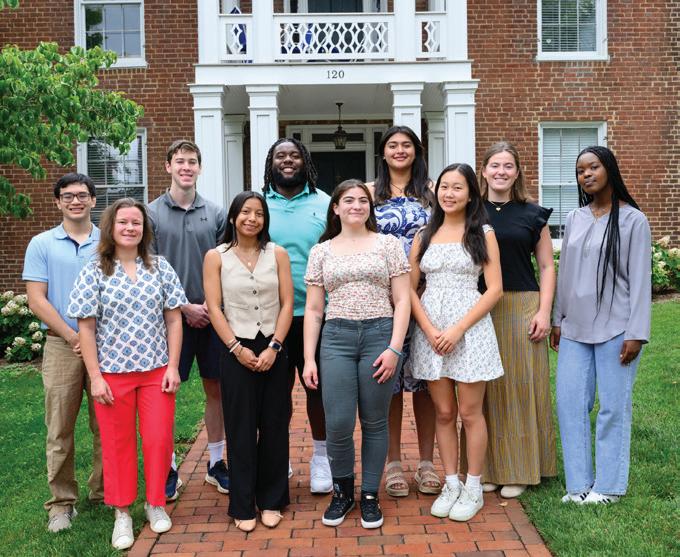
10 students participated in the Summer of 2025 CBL Summer Internship Program, supporting 8 different local organization.
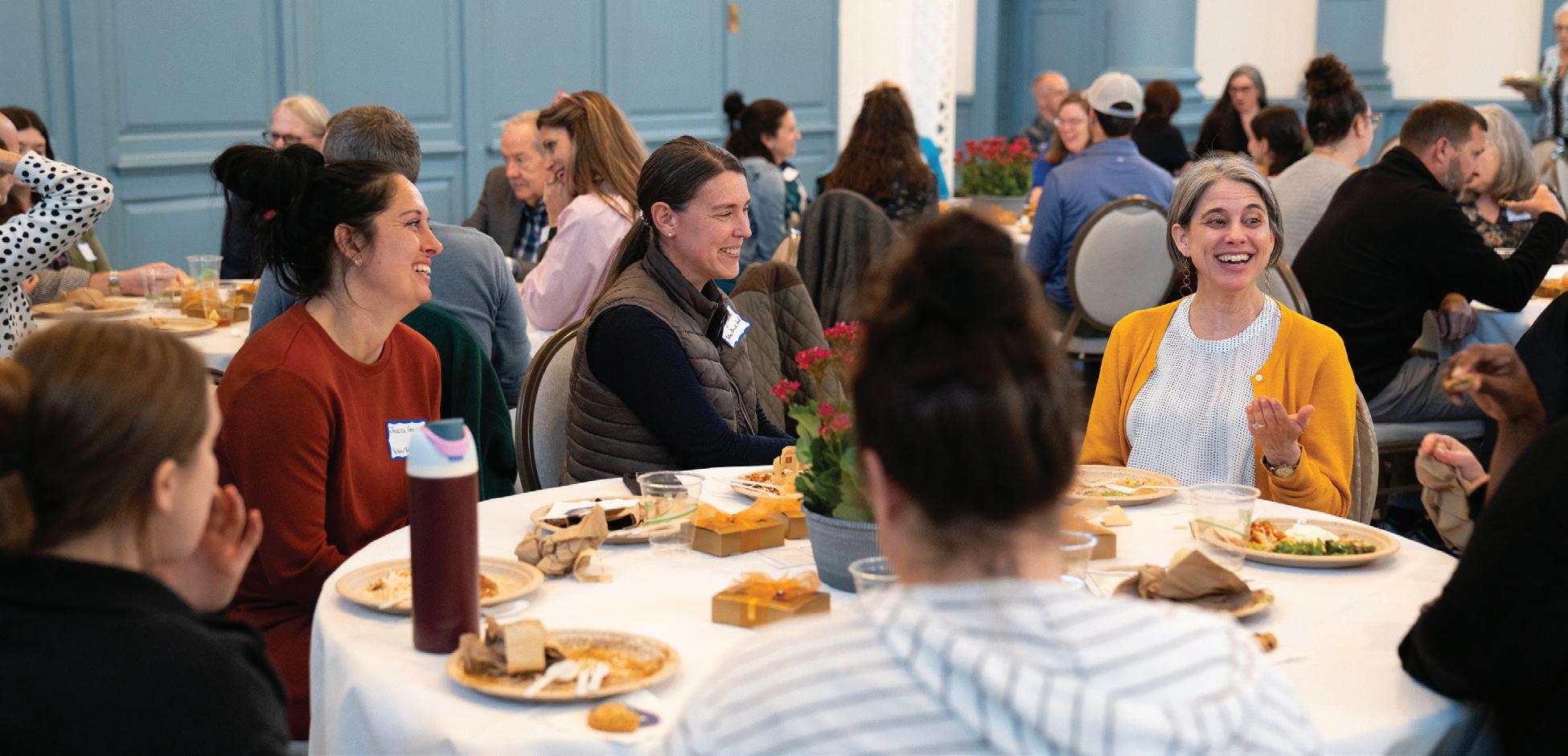
In April, the Office of Community-Based Learning (CBL) hosted its End of the Year Bi-Annual Appreciation Celebration, a vibrant gathering that brought together invaluable community partners and dedicated faculty and staff. The event served as a meaningful opportunity to celebrate the impactful collaborations of the past year, foster connections, and reflect on the shared commitment to the local community.
The energy in the room highlighted the deep gratitude for the time, mentorship, and vital expertise shared through community-university collaborations. Everyone’s dedication was instrumental in providing students with rich, handson learning experiences that extended beyond the classroom walls and created tangible benefits for the Rockbridge County area. These partnerships encompassed a diverse range of initiatives, offering students opportunities to apply their knowledge, develop critical skills, and contribute to the local community’s well-being. The Office of Community-Based Learning extends its deepest gratitude to all the community partners, faculty, and staff. ■
